Better known by his stage name Avicii, Tim Bergling rose to international fame as an EDM DJ before dying by suicide in 2018.
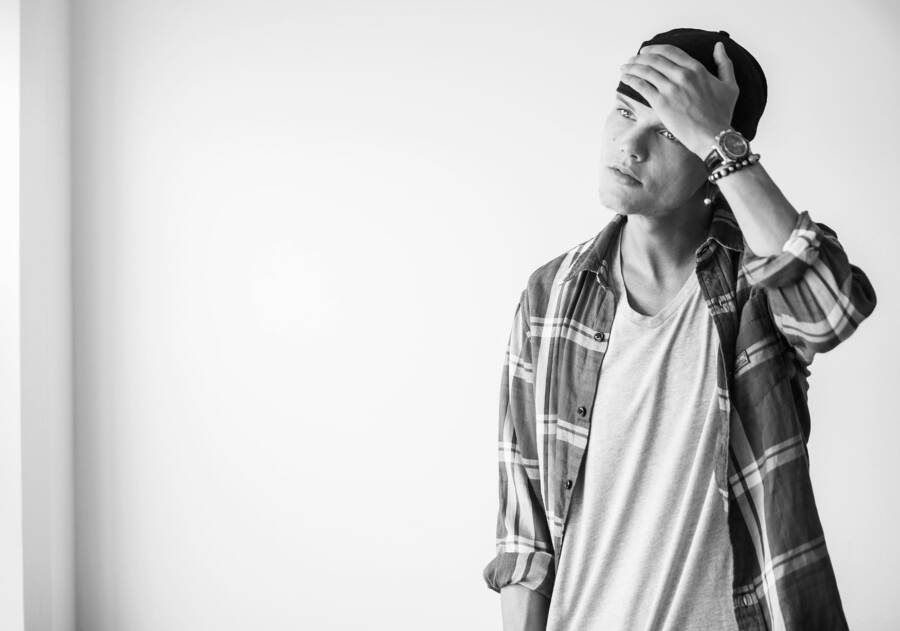
Wikimedia CommonsAvicii was just 28 years old at the time of his death.
When Avicii was found dead in 2018, the electronic dance music (EDM) community was in shock. The Swedish DJ and producer had taken the genre by storm with just two albums, and was only 28 when he died. Tragically, the cause of Avicii’s death was soon reported to be suicide.
Avicii, whose real name was Tim Bergling, was on vacation in Muscat, Oman at the time of his death. His body was reportedly found with self-inflicted wounds, and although the details of his suicide remain murky, it’s believed that he used shards of glass from a broken bottle to kill himself.
In the years leading up to his death, Avicii had suffered from numerous physical and mental health issues. These problems included anxiety, depression, alcoholism, painkiller addiction, acute pancreatitis brought on by heavy drinking, a ruptured appendix, and issues with his gallbladder.
But many believed that Avicii was in recovery after he retired from touring in 2016. Amidst the widespread shock, ominous rumors began to spread online, with some social media users even claiming that the EDM star had been murdered. Fact-checking websites such as Reuters adamantly refuted these eyebrow-raising claims, but conspiracy theories persist to this day.
However, most who knew Avicii personally were well-acquainted with his mental and physical health problems and the trouble he had adjusting to international fame. This, of course, didn’t make the tragic loss any easier.
The Early Life And Rise Of Avicii

Ericsson/FlickrAvicii’s stage name was inspired by the term Avīci, which refers to the lowest level of Buddhist hell.
Avicii was born Tim Bergling on September 8, 1989, in Stockholm, Sweden. His father Klas Bergling ran a successful office supply business, while his mother Anki Lidén was a celebrated actress in the country.
The future EDM icon had a fairly typical childhood and had three siblings: David, Linda, and Anton. Inspired by one of his brothers, who worked at a nightclub, Avicii downloaded beat-matching software at age 16 and quickly began producing his own music. Before long, he set up a MySpace account to promote his work. He also frequented the Laidback Luke forums.
By the time he was 18, Avicii had been discovered by Ash Pournouri, who would go on to be his manager and help him become a star.
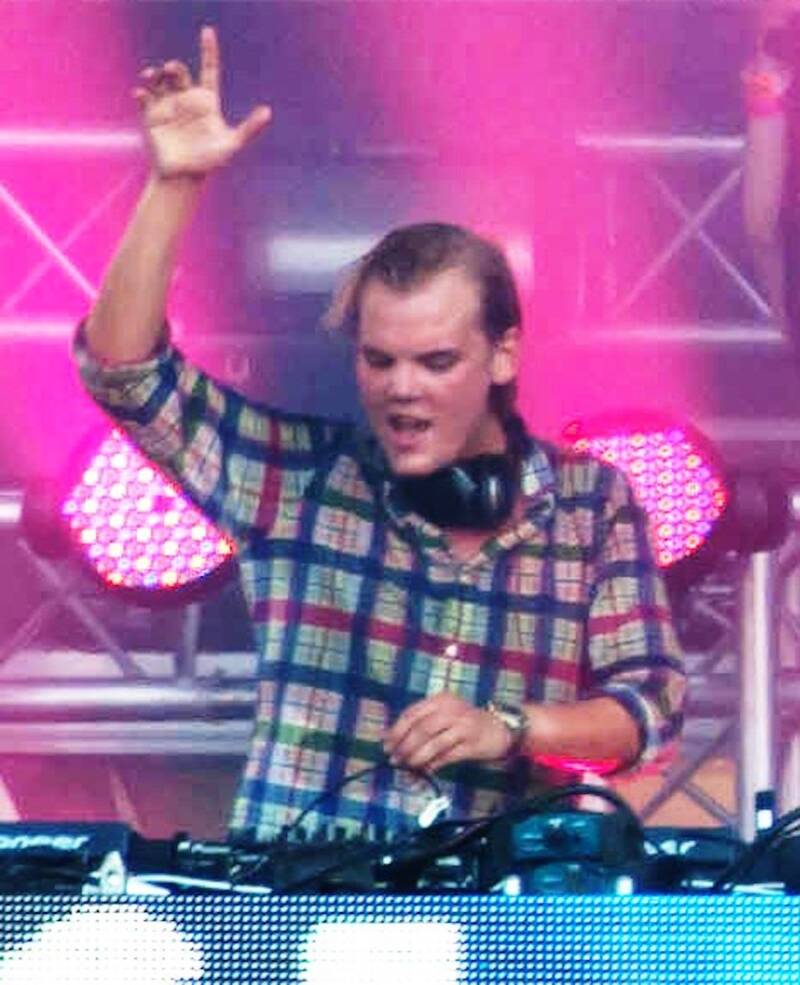
Wikimedia CommonsAvicii at Inox Park Paris in 2011. Avicii would go on to perform hundreds of shows before his death.
“He ran across some of my stuff on the blogs and sent me a Facebook message asking to meet up for a coffee!” Avicii told Magnetic Magazine in 2011. “From that point he just kind of started helping me out… but then as the project and his involvement grew we signed a management agreement and that’s definitely been the best career move I’ve made.”
While his first hit “Seek Bromance” in 2010 was released under the name “Tim Berg,” he cemented his Avicii stage name (inspired by the term Avīci, the lowest level of Buddhist hell) with his track “Levels” in 2011. His rise that year was supersonic, as Avicii worked with the world-famous French DJ David Guetta on “Sunshine” and performed at Lollapalooza in Chicago.
Avicii experienced about five more years of massive success — including the international hit single “Wake Me Up” in 2013 — before retiring from live performances. Despite the highs, Avicii also endured many lows.
The DJ’s Mental And Physical Health Struggles
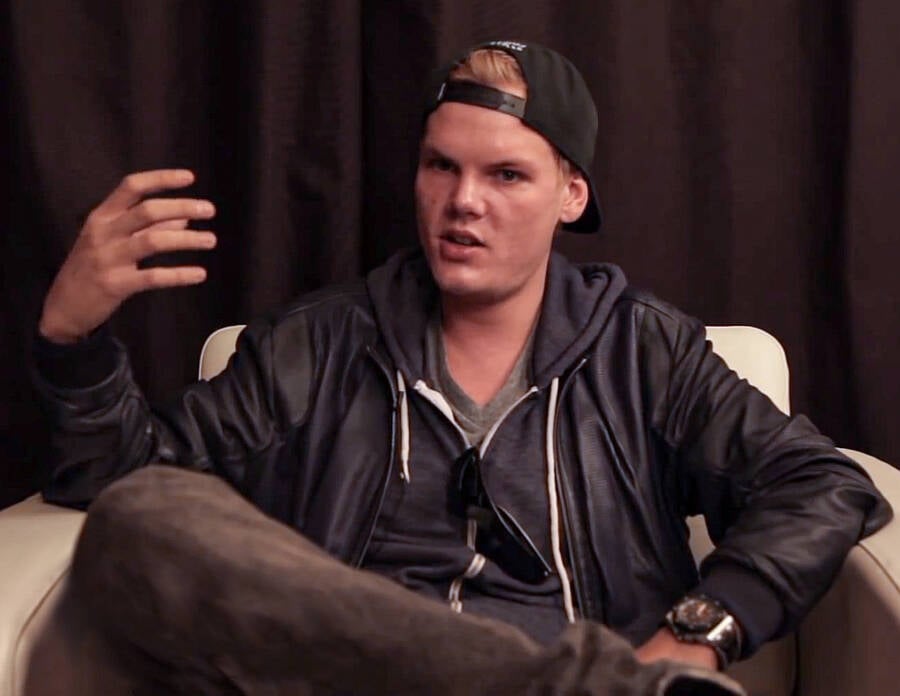
Wikimedia CommonsAvicii, seen here in 2012, was hospitalized that year for acute pancreatitis, brought on by alcohol abuse.
On the surface, it seemed like Avicii was living the dream. At the height of his popularity, he was one of the highest-paid DJs on Earth, making $28 million in 2014. He also had the chance to perform for millions of fans all over the world. But he had also become dangerously dependent on alcohol.
As he would later put it in the 2017 documentary Avicii: True Stories: “In the beginning, I was too afraid to drink because I didn’t want to screw up. But then I realized how stiff I was when I wasn’t drinking. Then I found the magical cure of having a couple of drinks before going on stage.”
Avicii had long struggled with anxiety and depression, and fame only exacerbated his problems. His father also said that he was “a shy person” who felt uncomfortable around crowds. Before long, Avicii relied on alcohol not only for touring but also to cope with his mental health issues.
In 2012, he was admitted to the hospital for acute pancreatitis, which had been brought on by his heavy alcohol use. Doctors told the then-22-year-old that he needed to stay sober for at least six months. Fatefully, he was also prescribed an opioid to help him with his terrible stomach pains.
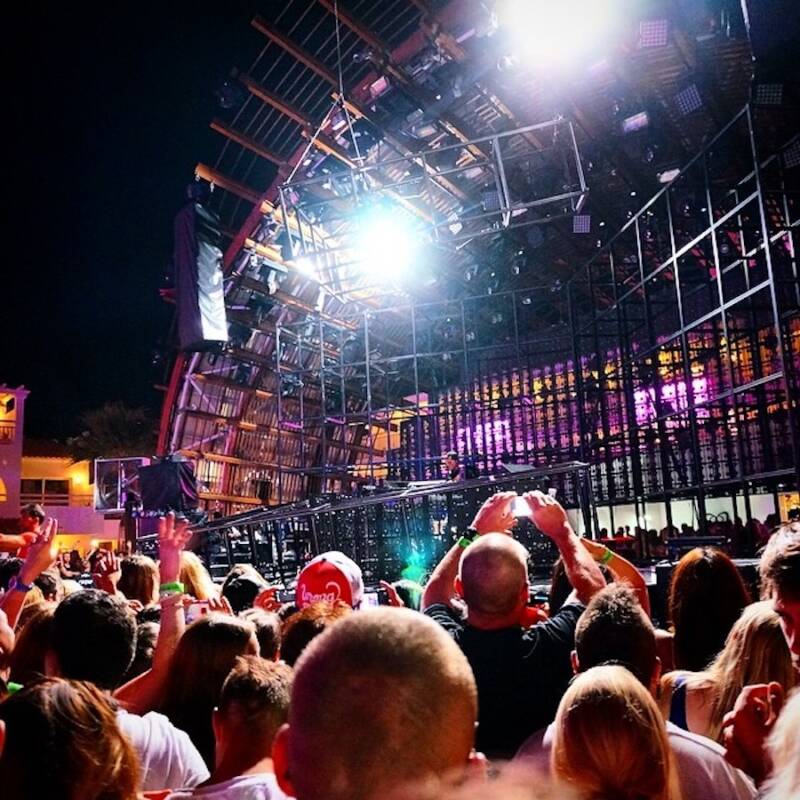
Wikimedia Commons Avicii performing at Ushuaïa Ibiza in 2014, just a few years before his death.
According to Addiction Center, Avicii continued to drink after he got back on tour. He also began regularly popping pills. Avicii later said, “I was ignorant and naive and touring the world, still on the never-ending tour because once you’ve circled it once, guess what? You start right back over again.”
By 2013, his stomach pains had returned, and doctors said he needed to have his gallbladder removed. But he delayed the procedure until his appendix burst the next year — meaning he had to have both organs removed. Following the operations, he was prescribed more painkillers.
Avicii’s family and friends staged an intervention in 2015, pushing him to attend rehab in Ibiza. Though he had previously resisted their help, he eventually agreed to a one-month intensive treatment program and began to realize how reliant he was on alcohol and pills to help with his pain.
By the time he left rehab, he seemed like a new man. Determined to put his addiction struggles behind him, he began focusing on transcendental meditation as a way to clear his head and to reduce his anxiety. In 2016, he made the difficult decision to retire from touring entirely to focus on his mental health. But sadly, it wouldn’t be enough to save him in the end.
The Tragic Death Of Avicii
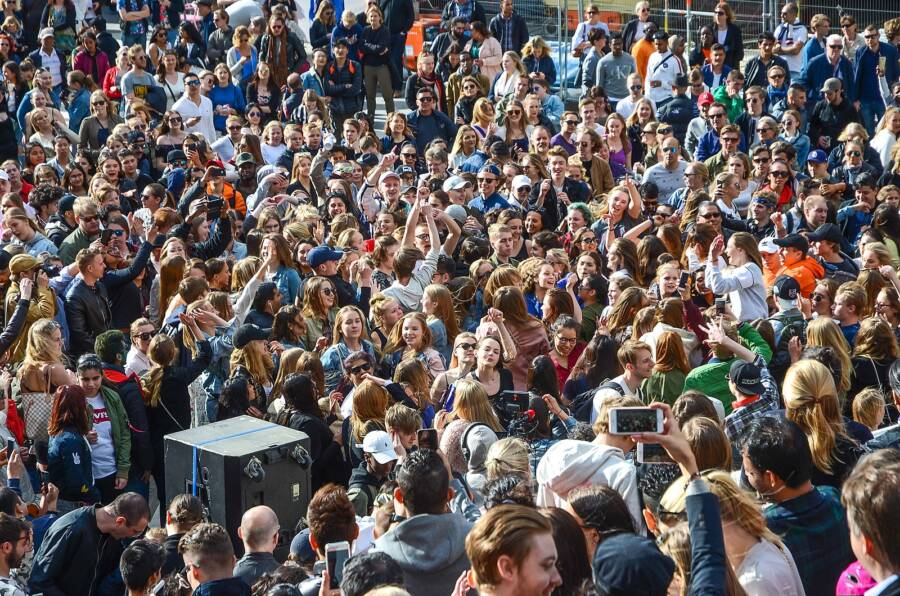
Wikimedia CommonsThe day after Avicii died, fans celebrated his legacy at a memorial event in Stockholm.
In 2018, Avicii decided to travel to Muscat, Oman on vacation. While there, he continued his ongoing practice of transcendental meditation. But by that point, Avicii’s meditation practice had become a near-obsession.
According to The Guardian, he often meditated for hours at a time, determined to achieve enlightenment as soon as possible. Sometimes, he would even meditate for a full day, refusing to eat or speak to anyone. While in Oman, he would even refuse to step out of the blazing sun. He was also smoking weed at this time, which some now believe led to psychosis.
His final diary entry, which was later published in the book Tim – The Official Biography of Avicii, offers a chilling glimpse into his mindset before he died: “The shedding of the soul is the last attachment, before it restarts!”
One friend was so concerned about Avicii’s mental state that he called Avicii’s father. Tragically, just one day later, Avicii would be found dead in Muscat on April 20, 2018. It was later reported that the 28-year-old had died by suicide after cutting himself with shards from a broken glass bottle.
His heartbroken family released a statement to the media: “Our beloved Tim was a seeker, a fragile artistic soul searching for answers to existential questions… He really struggled with thoughts about Meaning, Life, Happiness. He could not go on any longer. He wanted to find peace.”
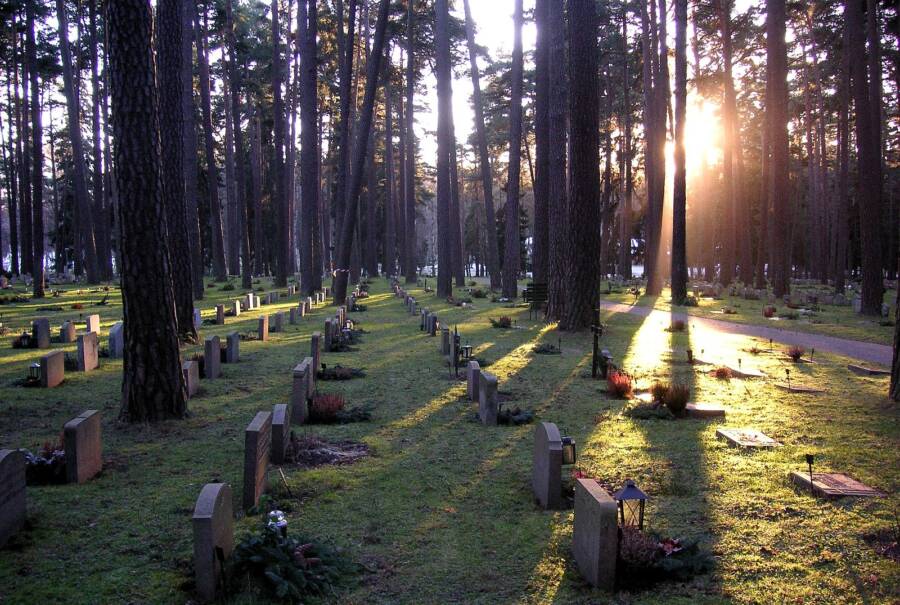
Wikimedia CommonsAvicii was buried in the Skogskyrkogården cemetery in Stockholm.
Despite the suicide ruling, Avicii’s death sparked ominous theories among some fans, who suggested that the EDM icon was murdered. Some claimed that he was working on an unfinished documentary about child sex trafficking called The Silent Children and he was killed because of that (other celebrities who died by suicide around the same time, including Anthony Bourdain and Chris Cornell, also became the subject of such rumors).
Fact-checking websites like Reuters strongly denied those claims, and a representative from The Silent Children said that Avicii was not involved in the documentary at all, nor was Bourdain or Cornell. The spokesperson said, “None of the people mentioned were ever involved in our project and we were never even remotely in contact with them… [We] were not able to raise funding to move forward. The project was abandoned at least five years ago.”
Some fans even suggested that Avicii had been murdered by his manager Ash Pournouri, whom he had parted ways with in 2016. But there has never been any hard evidence to support this theory, and police in Oman have confirmed that there was no “criminal suspicion” in the death of Avicii. Furthermore, most of Avicii’s loved ones have accepted the suicide ruling.
In fact, in an interview after Avicii’s death, his father Klas Bergling emphasized the importance of using the word “suicide” when talking about what had happened to his son. “I think you should call things what they are,” he said. “It’s fame and fortune, and that’s a very dangerous combination.”
Avicii’s parents were also inspired to start the Tim Bergling Foundation in his honor, advocating for recognizing suicide as a global health emergency. Klas Bergling said, “[We’re] trying to get the stigma away from talking about mental illness and suicide. We hope we can be a voice through Tim. Because Tim has so many millions of fans.” Bergling also hopes the foundation can help anyone who might be struggling with anxiety and depression like his son: “You have to talk about it. And you shouldn’t be afraid to ask for help.”
After learning about Avicii’s death, read about the tragic death of Marilyn Monroe. Then, go inside the murder of the Notorious B.I.G.





